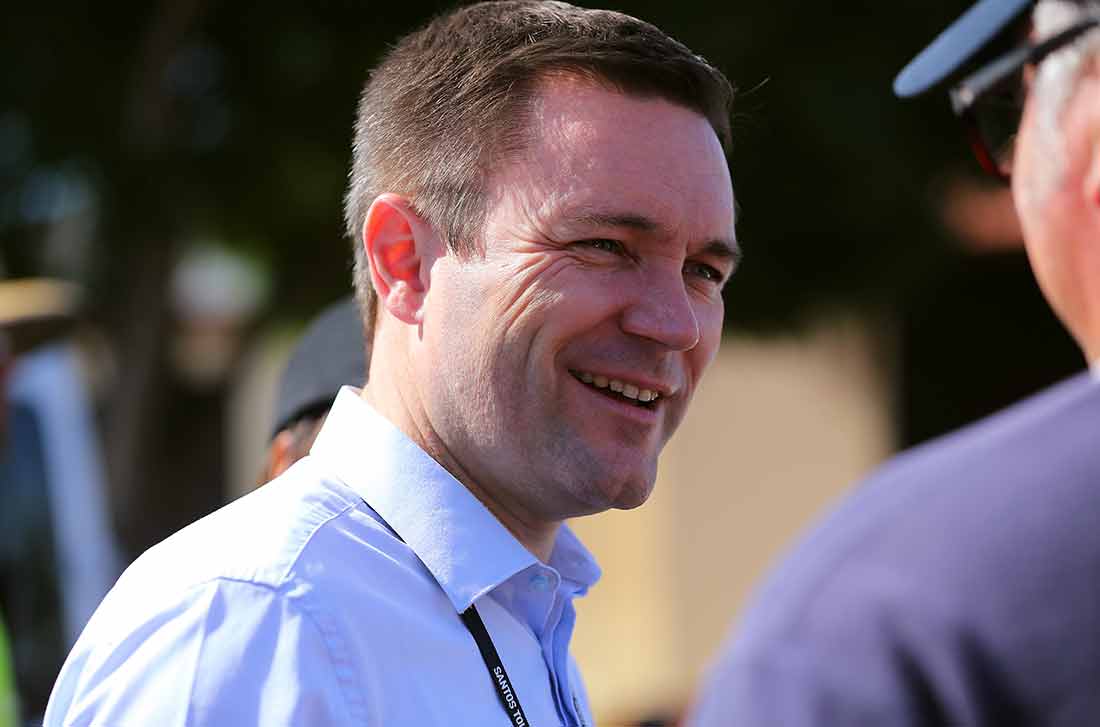Lappartient blasts Wiggins' description of Armstrong as 'perfect' Tour rider

Photo: Tim De Waele | Getty Images (FILE)
LONDON (VN) — David Lappartient, President of the UCI, has dismissed Bradley Wiggins’ description of Lance Armstrong in his new book as one of cycling’s icons and, as the “perfect” Tour de France rider, as “unbelievable” and “unacceptable”.
Speaking to a select group of media in central London today, where he was making an appearance at the Rouleur Classic bike show, Lappartient — marking a little over a year since he was first elected to the UCI Presidency — said that he “fully disagreed” with Wiggins.
“Wiggins has always said some strange things,” Lappartient said. “When I saw that (what Wiggins said about Armstrong) I thought it unbelievable.”
“Wiggins won the Tour de France, he has been Olympic champion, he has been world champion and in supporting Lance Armstrong — who has been banned for life for cheating — for me this isn’t acceptable to have a statement like this, specifically from a former winner of the Tour de France.”
Speaking in the aftermath of convicted doper Alejandro Valverde’s crowning as UCI world road race champion and the imposition of a life ban on Armstrong’s former sports director Johan Bruyneel, Lappartient refused to acknowledge any double standards, insisting instead that Armstrong’s use of doping to claim seven Tour de France titles stood apart from the misdemeanors of others among road racing’s most celebrated names.
“There is a big difference in what happened with Lance Armstrong and what happened some time in the past. I will not come back on it all otherwise we can go back to the Pelissier brothers in 1924.”
Lappartient said that he drew a line in the sand of what he called the “hierarchy of cycling” after 1992, “specifically with EPO”.
“The big difference between them is some riders paid,” he said of the doping bans served by multiple top riders, from the so-called Generation EPO era. “They were caught. They paid two years, maybe more, then came back. It’s the case of Alexandre Vinokourov, David Millar, Alejandro Valverde.”
“That was not the case with Armstrong. He always denied (doping). It’s not the same situation. When Armstrong paid, it was just because he had big pressure from American justice. That’s why he couldn’t come back.”
In a wide-ranging conversation, Lappartient also hinted that Tour promoters ASO may soon introduce a women’s Paris-Roubaix and that a week-long, or ten day, women’s Tour de France, structured around the final week of the men’s Tour, was also being considered.
Lappartient said that he had told ASO that, as the world’s leading race organizer, it had to take its share of the responsibility to support women’s cycling.
“Times are changing,” he said, while acknowledging that they were changing faster in some cultures than in others. “I made three points to ASO. Firstly, that we could maybe have a Paris-Roubaix for ladies. I think they are not only open to this, but they are working on this. Maybe not for next year, but for the year after (2020).”
The UCI President said that he had also encouraged ASO to go further by integrating a women’s race into the men’s Tour de France.
“ASO are thinking maybe of a one-week stage race,” he said. “I would support this. But I told them why not the last 10 days the same stages for men and women? I think three weeks (for a women’s Tour) is too long. But 10 days? Maybe not the same starts, but the same finishes.”
But the critical issues surrounding the future of anti-doping, in the aftermath of the MPCC’s calling on World Anti-Doping Association (WADA) President, Craig Reedie, to resign, dominated the conversation.
Lappartient had only been UCI President for a matter of hours when he learned of Chris Froome’s adverse analytical finding for Salbutamol. Although the case against Froome was eventually dropped, the UCI President was one of many who said that Team Sky should have benched their leader during the process.
However, he acknowledged that the polemics surrounding the Froome case, along with several other controversies, had damaged the anti-doping movement and also supported calls for what he described as a “review” of WADA.
“There is a problem with salbutamol,” he said of the Froome controversy. “When you had a leak in which you say there is a limit of 1000, Froome has 2,000, so of course for everybody on the street he’s a cheater.”
“The reality is a little bit different. In the meantime, WADA introduced a way to correct a direct result with gravity, to increase or reduce — in the case of Froome it was a strong reduction — and it seemed the validity of the testing is something WADA will have to look at.”
But despite a bruising few months for the anti-doping movement, Lappartient also described WADA as “very important”.
“We need a strong WADA. We need a strong governing body for anti-doping. That’s why I’m calling to have a stronger WADA and maybe to review the governance of WADA,” he said.
The Frenchman also revealed that the UCI plan to ban controversial painkiller Tramadol, which has been widely blamed for causing crashes, and that they are lobbying for greater restrictions on glucocorticosteroids.
“We’re still pushing to have these two substances on the list. Unfortunately it has not been possible and it will not be for a short time. I spoke with Craig Reedie about this. We took our responsibility (to act on Tramadol) — not for anti-doping, this is not our duty — but for health reasons.”
“We have a new medical director at the UCI and he’s working on this,” Lappartient said, adding that he expected a ban on Tramadol to be in place by March next year. “If you need some Tramadol, no problem, but you will not be able to ride and take part in a race.”